Baby oil is a gentle and versatile product that offers several benefits for the skin. This is a rundown of its benefits, usage, and potential side effects.
Unveiling the Benefits of Using Baby Oil on Your Skin
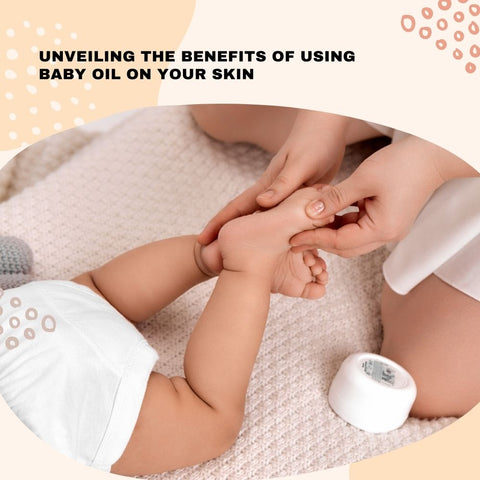
Baby oil, due to its mild and moisturising properties, can provide a variety of skin benefits. Some of the benefits include moisturising dry skin, soothing inflammation, removing makeup, improving shaving, locking in moisture after showering, promoting healthy cuticles, adding shine to hair, and providing soft massage oil. When applying baby oil to your skin, it is critical to conduct a patch test first, especially if you have sensitive or acne-prone skin, to ensure that you do not encounter any bad effects. Choose fragrance-free baby oil to reduce the risk of irritation. Overall, using baby oil in your skincare routine can help keep your skin hydrated, silky, and healthy.
Baby Oil as a Skin Moisturizer: Does It Work?
Yes, baby oil can work well as a skin moisturiser for many people. Here's why: emollient qualities, non-irritant flexibility, and cost. However, it is important to note that while baby oil can be an excellent moisturiser for many people, it may not be appropriate for everyone. Some people may find that mineral oil-based products, such as baby oil, feel overly thick or heavy on their skin, particularly if they have oily or acne-prone skin. Additionally, if you have a known allergy or intolerance to mineral oil or any other substances in baby oil, you should avoid using it and instead use alternative moisturisers.
Baby Oil for Skin Hydration and Dryness
Baby oil can help keep skin hydrated and combat dryness. Here's how it is done:
-
Seals in Moisture: Baby oil, which is usually made from mineral oil or a combination of mineral oil and fragrance, forms a protective barrier on the skin's surface. This barrier prevents water loss from the skin, locking in moisture and keeping it hydrated for longer.
-
Softens and Smoothes: Baby oil's emollient properties make it effective for softening and smoothing the skin. It can help to soothe rough, dry skin and leave it feeling supple and silky.
-
Versatility: Baby oil can be used on a variety of body parts, including dry areas like elbows, knees, and heels. It can also be used as a post-shower moisturiser to lock moisture into damp skin.
-
Gentle on the Skin: Baby oil is designed to be gentle and non-irritating, making it ideal for sensitive skin. It is usually hypoallergenic and free of fragrances, dyes, and other potential irritants.
-
Cost-Effective Alternative: Baby oil is a convenient and reasonably priced option for individuals seeking an efficient moisturiser without breaking the bank.
Nonetheless, it is critical to use baby oil as recommended and to be aware of any possible risks. Some people, particularly those with oily or acne-prone skin, may find that baby oil feels excessively greasy or heavy on their skin. Furthermore, even though the majority of people consider mineral oil to be safe, some people may choose to avoid it out of concern for environmental effects or clogged pores.
Baby Oil as a Makeup Remover: A Gentle Approach
Yes, baby oil works very well as a mild and efficient makeup remover. Here's how it functions:
-
Dissolves Makeup: Mineral oil, found in baby oil, has great cleansing qualities and works wonders in removing waterproof foundation, eyeliner, and mascara. It assists in dissolving the makeup so that it can be removed with ease and without causing severe friction or pulling on the skin.
-
Mild on Skin: Baby oil is safe to use around the sensitive eye area because of its non-irritating formulation. Unlike some makeup removers that contain harsh ingredients or alcohol, baby oil is less likely to deplete the skin's natural oils or cause irritation.
-
Hydrating: In addition to removing makeup, baby oil hydrates the skin, leaving it soft and moisturised. This is especially useful for those with dry or sensitive skin, who may benefit from the additional hydration.
Follow up with a gentle cleanser to remove any remaining oil residue and ensure your skin is completely clean. Furthermore, if you wear heavy or long-lasting makeup, you may need to repeat the procedure or use a different cleanser to ensure complete removal.
Is Baby Oil Safe for Your Skin?
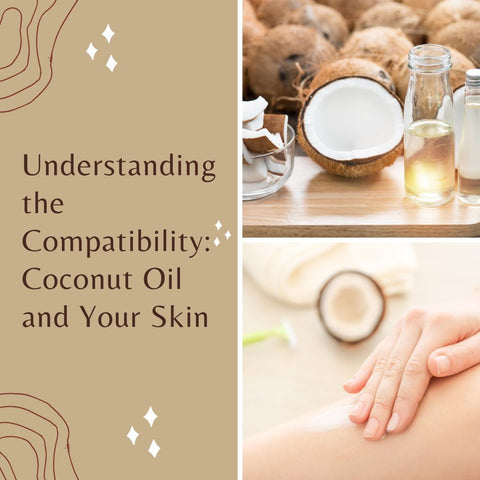
Baby oil is generally considered safe to use on the skin, particularly for adults and children with normal skin. Here are some important points to consider about the safety of baby oil:
-
Hypoallergenic Formulation: Most baby oils are hypoallergenic, which means they are less likely to cause allergic reactions and skin irritation. They are usually free of harsh chemicals, fragrances, and dyes that can irritate sensitive skin.
-
Non-comedogenic: The primary ingredient in baby oil is usually mineral oil, which is not comedogenic. This means it is unlikely to clog pores or cause acne breakouts, making it suitable for the majority of skin types, including oily and acne-prone skin.
-
Gentle and Mild: Baby oil is designed to be gentle and mild, making it appropriate for use on delicate and sensitive skin, including infant skin. Its soothing properties make it popular as a moisturiser, massage oil, and makeup remover.
-
Patch Test: While baby oil is generally safe for most people, it is important to do a patch test first, especially if you have sensitive skin or a history of allergies. Apply a small amount of baby oil to a small area of your skin and wait 24 hours to see if it causes any adverse reactions.
-
Avoid Ingestion: Although baby oil is safe for external use, it should not be consumed. Keep baby oil out of reach of children to prevent accidental ingestion, as it can be harmful if swallowed.
-
Avoid Eye Contact: Baby oil should not be applied directly to the eyes, as it can cause irritation or discomfort. If baby oil comes into contact with the eyes, rinse thoroughly with water and seek medical attention if irritation persists.
-
Use Caution with Fragranced Varieties: Some baby oils may contain added fragrances, which can be irritating to sensitive skin or individuals with fragrance allergies. If you have sensitive skin, opt for fragrance-free baby oil to minimize the risk of irritation.
Understanding the Side Effects of Baby Oil on Skin
While most people consider baby oil to be safe, there are some potential side effects and considerations to keep in mind:
-
Skin Irritation: Some people may experience skin irritation or allergic reactions after using baby oil, particularly if they have sensitive skin or are allergic to any of the ingredients. Irritation symptoms can include redness, itching, burning, or rash. If you experience any of these symptoms, stop using the product and see your dermatologist.
-
Pore Clogging: Baby oil is considered non-comedogenic, which means that pores are less likely to become clogged. It is mainly made of mineral oil. However, for some people with oily or acne-prone skin, using baby oil can aggravate acne or cause breakouts. If you are concerned about pore clogging, use lighter, water-based moisturisers instead.
-
Slippery Surfaces: Baby oil can cause slippery surfaces, so exercise caution when using it in the bath or shower to avoid accidents or falls. Make sure the area is thoroughly cleaned after use to avoid slips and falls for yourself and others.
-
Staining Clothing: If baby oil is not completely absorbed into the skin, it can stain clothing or bedding. To reduce the possibility of staining, let the oil absorb completely before dressing or lying on fabric surfaces.
-
Eye Irritation: Avoid putting baby oil in your eyes because it can cause irritation or discomfort. If baby oil comes into contact with your eyes, rinse them thoroughly with water and seek medical attention if the irritation persists.
-
Ingestion Risk: Baby oil is only for external use and should not be consumed. Keep baby oil out of the reach of children to avoid accidental ingestion, as it can be harmful if swallowed.
-
Fragrance Sensitivity: Some baby oils may contain added fragrances that can irritate people who are sensitive to fragrances or have allergies. If you have sensitive skin, choose fragrance-free baby oil to reduce the risk of irritation.
Baby Oil for Sensitive Skin: Is It Suitable?
Baby oil may be suitable for sensitive skin, but this depends on the individual's skin sensitivities and the ingredients in the baby oil formula. Consider the following factors when using baby oil for sensitive skin:
-
Many baby oils are hypoallergenic, which means they are unlikely to cause allergic reactions or skin irritation. These formulas are often free of harsh chemicals, fragrances, and dyes, which can cause sensitivity in some people.
-
Some baby oils contain added fragrances, which can irritate sensitive skin or those with fragrance allergies. If you have sensitive skin, choose fragrance-free baby oil to reduce the risk of irritation.
-
Before applying baby oil to sensitive skin, perform a patch test. Apply a small amount of baby oil to a small area of your skin, such as the inner forearm, and allow 24 hours to see if any adverse reactions occur. If you experience redness, itching, burning, or a rash, stop using the product and see a dermatologist right away.
-
Baby oil is typically made from mineral oil, which is non-comedogenic and less likely to clog pores. Individuals with sensitive or acne-prone skin should still exercise caution and monitor their skin's reaction when using baby oil.
-
When applying baby oil to sensitive skin, use it gently and sparingly to avoid irritating. Massage the oil into the skin in light, circular motions until completely absorbed. Avoid rubbing or pulling on the skin, particularly around sensitive areas such as the eyes.
-
If you have any concerns about using baby oil on sensitive skin, or if you have underlying skin conditions like eczema or rosacea, you should consult a dermatologist before incorporating baby oil into your skincare routine. They can make personalised recommendations based on your skin type and condition.
Baby Oil vs. Other Skincare Products: Pros and Cons
To compare baby oil to other skincare products, one must weigh the benefits and drawbacks of each product in light of the needs and preferences of each individual's skin. A summary is provided below:
Baby Oil:
Pros:
-
Skin is left feeling smooth and soft after using baby oil to effectively moisturise it.
-
It is appropriate for sensitive skin because it is typically made with a mild and non-irritating formula.
-
Baby oil has many uses, such as moisturising, massaging, removing makeup, and treating the scalp.
-
Baby oil is a cost-effective choice because it is frequently less expensive than a lot of other skincare products.
Cons:
- Baby oil can leave a greasy residue on the skin, which some people may dislike.
- While mineral oil-based baby oil is non-comedogenic, it can still clog pores for some people, resulting in breakouts.
- Baby oil typically contains mineral oil as its main ingredient and may lack other beneficial ingredients found in other skincare products.
- If baby oil is not completely absorbed into the skin, it can stain clothing or bedding, necessitating extra caution when applying it.
Other Skincare Products (e.g., Lotions, Creams, Serums):
Pros:
-
Skincare products are frequently designed with specific ingredients to address specific skin issues, such as ageing, acne, or hyperpigmentation.
-
There are numerous skincare products available, allowing people to customise their skincare routines to their specific needs and preferences.
-
Many skincare products include additional beneficial ingredients, such as antioxidants, vitamins, and botanical extracts, which nourish and protect the skin.
-
Skincare products come in a variety of textures, such as lightweight lotions, rich creams, and concentrated serums, to suit different skin types and preferences.
Cons:
-
Skincare products can be more expensive than baby oil, particularly those with advanced formulations and high-quality ingredients.
-
Some people may have sensitivity or allergic reactions to specific skincare ingredients, necessitating careful ingredient selection.
-
Skincare routines that include multiple products can be time-consuming and require more steps than using a single product, such as baby oil.
-
Finding the right skincare products that work well for your skin may require some trial and error, as not all products produce the same results.
Depending on the individual's preferences, skin type, and particular skincare needs, baby oil or other skincare products may be better. Some people may find that baby oil adequately meets their moisturising and skincare needs, whereas others may prefer the targeted formulations and additional benefits provided by other skincare products. It's essential to consider factors such as skin sensitivity, desired outcomes, and budget when selecting skincare products for your routine.
Incorporating Baby Oil into Your Skincare Routine
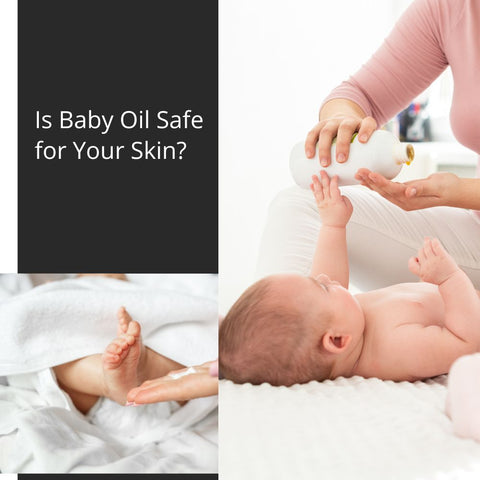
Including baby oil in your skincare routine can provide gentle hydration and nourishment to your skin. Here's how to effectively use baby oil in your daily skincare routine:
-
Baby oil can be used to gently and effectively remove makeup. Apply a small amount of baby oil to a cotton pad and gently remove makeup from your face, including waterproof mascara and eyeliner. Finally, use a gentle cleanser to remove any remaining oil residue.
-
To lock in moisture, apply baby oil to damp skin after a shower or bath. Pat your skin dry with a towel, then apply a small amount of baby oil while it is still damp. This helps to seal in moisture, leaving your skin feeling soft and hydrated.
-
Apply baby oil to dry or rough skin areas like elbows, knees, and heels. Massage a small amount of oil into these areas to soften and moisturise your skin.
-
Use baby oil as a gentle massage oil to relieve and relax tired muscles. Warm a small amount of oil between your palms, then gently massage it into your skin in circular motions.
-
Baby oil can also be used to moisturise and soothe dry, flaky scalps. Apply a small amount of oil to your scalp and massage with your fingertips. Leave it on for a few hours or overnight, then shampoo and rinse normally.
-
Add a few drops of baby oil to your bath water to soften and moisturise your skin as you soak. This can be especially beneficial for individuals with dry or sensitive skin.
-
Massage baby oil into your cuticles to help soften and moisturize them. This can help prevent dryness and cracking, keeping your nails and cuticles looking healthy.
-
After spending time in the sun, apply baby oil to your skin to help soothe and moisturize sun-exposed areas. This can help alleviate dryness and prevent peeling.
How to Properly Apply Baby Oil on Your Skin
To guarantee efficient moisturization and absorption, follow these simple steps when applying baby oil to your skin. Here's how to do it: Begin with clean skin, dispense a tiny amount, warm the oil, apply it to damp skin, massage gently, allow absorption, avoid overuse, reapply as needed, and wash hands after usage. Follow these instructions to correctly apply baby oil to your skin, making it soft, smooth, and nourished. Adjust the amount of oil and frequency of application based on your skin type and preferences.
Baby Oil for Massage: Relaxation and Skin Benefits
Using baby oil for massage can provide both relaxation and skin benefits. Here's how it is done:
Relaxation:
-
Soothing Sensation: Baby oil has a silky texture that glides smoothly over the skin, providing a soothing sensation when massaged.
-
Calming Aroma: Although fragrance-free baby oil is available, scented versions can provide aromatherapy benefits by promoting relaxation and stress relief during massage.
-
Muscle Relaxation: The gentle pressure of massage, combined with the lubricating properties of baby oil, can help relax tense muscles, relieve stiffness, and reduce stress.
Skin Benefits:
-
Hydration: Baby oil deeply hydrates the skin, leaving it soft, smooth, and moisturised after massage.
-
Nourishment: Baby oil's emollient properties help nourish and replenish the skin's natural oils, resulting in better overall skin health and appearance.
-
Protection: Baby oil creates a barrier that keeps moisture in and water out of the skin, which is especially helpful for skin that is sensitive or dry.
-
Sensitivity: Baby oil is ideal for sensitive skin types because it is typically made with a mild and non-irritating formula.
Precautions and Tips for Using Baby Oil on Your Skin
When applying baby oil to your skin, you must take certain precautions and follow specific guidelines to ensure a safe and effective experience. Here are some precautions and tips when using baby oil:
Precautions:
-
Patch Test: Before applying baby oil for the first time, perform a patch test on a small area of your skin, such as the inner forearm. Allow 24 hours to check for allergic reactions or irritation. If you experience any redness, itching, or irritation, stop using it immediately.
-
Avoid Ingestion: Baby oil is only for external use and should not be consumed. Keep it out of the reach of children to avoid accidental ingestion, as it can be dangerous if swallowed.
-
Keep Baby Oil Away from Your Eyes: Baby oil can cause irritation or discomfort if it gets into your eyes. If baby oil comes into contact with your eyes, thoroughly rinse with water.
-
Use sparingly: Baby oil can go a long way. Massage a small amount of oil into the skin in thin, even layers to avoid a greasy or oily residue.
-
Avoid Slippery Surfaces: When using baby oil in the bath or shower, be cautious because it can cause slippery surfaces, which can lead to accidents or falls. Clean the area thoroughly after use to remove any remaining oil.
Tips:
-
Apply to Damp Skin: For the best absorption, apply baby oil to damp skin right after showering or bathing. The oil will help to lock in moisture, leaving your skin soft and hydrated.
-
Makeup Remover: Baby oil is effective at removing makeup, including waterproof mascara and eyeliner. Apply a small amount to a cotton pad and gently remove makeup from your face.
-
Massage Oil: Use baby oil as a gentle massage oil to relieve muscle fatigue and promote relaxation. Warm the oil between your palms and massage it into your skin with gentle, circular motions.
-
Scalp Treatment: Massage baby oil into your scalp to moisturise and soothe dry or flaky skin. Apply it to your scalp with your fingertips, then shampoo and rinse as usual.
-
Cuticle Care: Apply baby oil to your cuticles to soften and moisturise them, preventing dryness and cracking.
-
Mix with Bath Water: Add a few drops of baby oil to your bath water to soften and moisturise your skin as you soak.
-
Post-Sun Care: To soothe and moisturise your skin after being in the sun, apply baby oil to sun-exposed areas.
By following these precautions and tips, you can safely and effectively incorporate baby oil into your skincare routine, reaping its moisturising and soothing benefits for your skin.
Baby Oil: Expert Insights and Recommendations
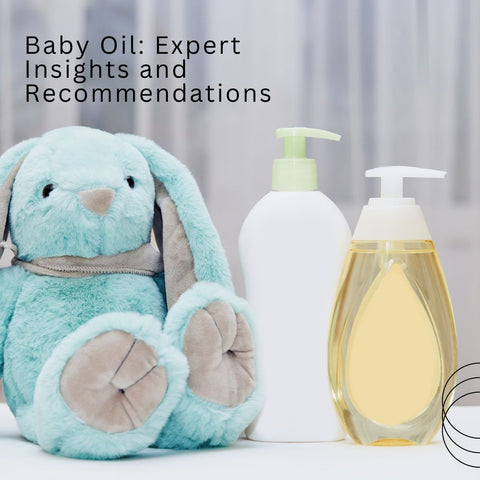
Expert advice and recommendations for using baby oil can differ depending on personal preferences and skin needs. However, here are some general insights and recommendations based on the advice of dermatologists and skincare experts:
-
Hydration: Dermatologists frequently recommend baby oil as a gentle and effective moisturiser for dry or sensitive skin. Its lightweight formula helps lock in moisture, leaving the skin feeling soft and hydrated.
-
Gentle Cleansing: Baby oil works well as a gentle makeup remover, particularly for waterproof or long-lasting makeup. It effectively removes makeup and pollutants while leaving the skin's natural oils intact.
-
Massage Oil: Baby oil's silky texture makes it a perfect choice for massages. It lubricates smooth massage strokes and moisturises the skin, facilitating relaxation and stress reduction.
-
Scalp and Hair Care: Baby oil can be used to moisturise and soothe a dry or flaky scalp. It can also be used on the ends of your hair to add shine and smoothness.
-
Cuticle Care: Massaging baby oil into your cuticles keeps them soft and moisturised, lowering the risk of dryness, cracking, and hangnails.
-
Bath Additive: Adding a few drops of baby oil to bath water can help soften and moisturize the skin while you soak, leaving it feeling nourished and hydrated.
-
Post-Sun Care: Applying baby oil to sun-exposed areas of the skin can help soothe and moisturize after sun exposure, providing relief from dryness and irritation.
-
Precautions: While baby oil is generally safe for most people, it's essential to perform a patch test before using it, especially if you have sensitive skin or allergies. Avoid getting baby oil in your eyes or ingesting it, and be cautious when using it in the bath or shower to prevent slips and falls.
What Dermatologists Say About Using Baby Oil on Skin
Dermatologists often have conflicting perspectives on using baby oil on the skin, as it is dependent on individual skin types, preferences, and concerns. Dermatologists frequently share insights and considerations about the usage of baby oil, including its moisturising capabilities, non-comedogenicity, sensitivity and allergies, use as a makeup remover, bath precautions, alternative moisturisers, and sun protection. A dermatologist can make personalised recommendations and provide help on how to safely and efficiently incorporate baby oil into your beauty regimen.
Exploring Alternatives to Baby Oil in Skincare
Investigating alternatives to baby oil in skincare can reveal solutions tailored to specific skin concerns and preferences. Here are some options to consider:
-
Natural Oils: Coconut oil, jojoba oil, almond oil, and olive oil can all be used as alternatives to baby oil. These oils moisturise and are high in vitamins and antioxidants, making them good for the skin.
-
Shea Butter: The nuts of the shea tree are the source of this all-natural moisturiser. It is appropriate for dry or sensitive skin types due to its emollient qualities, which help hydrate and soften the skin.
-
Glycerin: Glycerin draws moisture to the skin and keeps it hydrated and supple. It is a humectant. It can be added to skincare products to improve their moisturising qualities or used on its own.
-
Creams with ceramides: Ceramides are lipids that support and preserve the skin's moisture barrier. Ceramide creams and moisturizers are beneficial for individuals with dry or sensitive skin, as they help strengthen the skin barrier and prevent moisture loss.
-
Hyaluronic Acid Serums: Hyaluronic acid is a humectant that can hold up to 1000 times its weight in water, making it a great skin-hydrating substance. Hyaluronic acid serums and moisturisers plump and hydrate the skin, which reduces the appearance of fine lines and wrinkles.
-
Aloe Vera Gel: Aloe vera gel has soothing and moisturising characteristics, making it ideal for sensitive or irritated skin. It reduces inflammation, hydrates the skin, and promotes healing.
-
Petroleum Jelly: Petroleum jelly, like Vaseline, is an occlusive moisturiser that produces a protective layer on the skin, limiting moisture loss and encouraging healing. It can be used to moisturise dry or chapped skin, protect small cuts and burns, and treat nappy rash.
-
Emollient Creams: Emollient creams, like Eucerin or Cetaphil, are specifically designed to moisturise and soften the skin. They frequently contain glycerin, petrolatum, or dimethicone to seal in moisture and maintain the skin's natural barrier.
When selecting an alternative to baby oil, it is critical to consider personal skin needs, preferences, and any underlying skin conditions. Patch testing new products can help determine compatibility and avoid negative reactions. A dermatologist can also make personalised recommendations based on your specific skincare concerns.
Conclusion: Baby Oil and Your Skin Care Journey
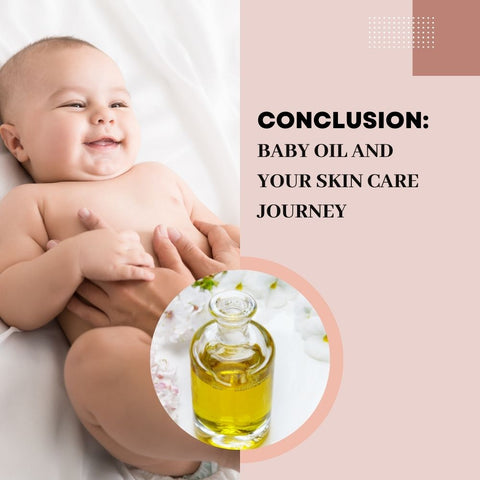
Including baby oil in your skincare routine can provide hydration, gentle cleansing, and relaxing effects, resulting in healthy-looking, nourished skin. When choosing skincare products, it is critical to take into account individual skin needs, preferences, and any underlying skin issues. A dermatologist can make personalised recommendations and provide help on how to safely and efficiently incorporate baby oil into your beauty regimen.









































